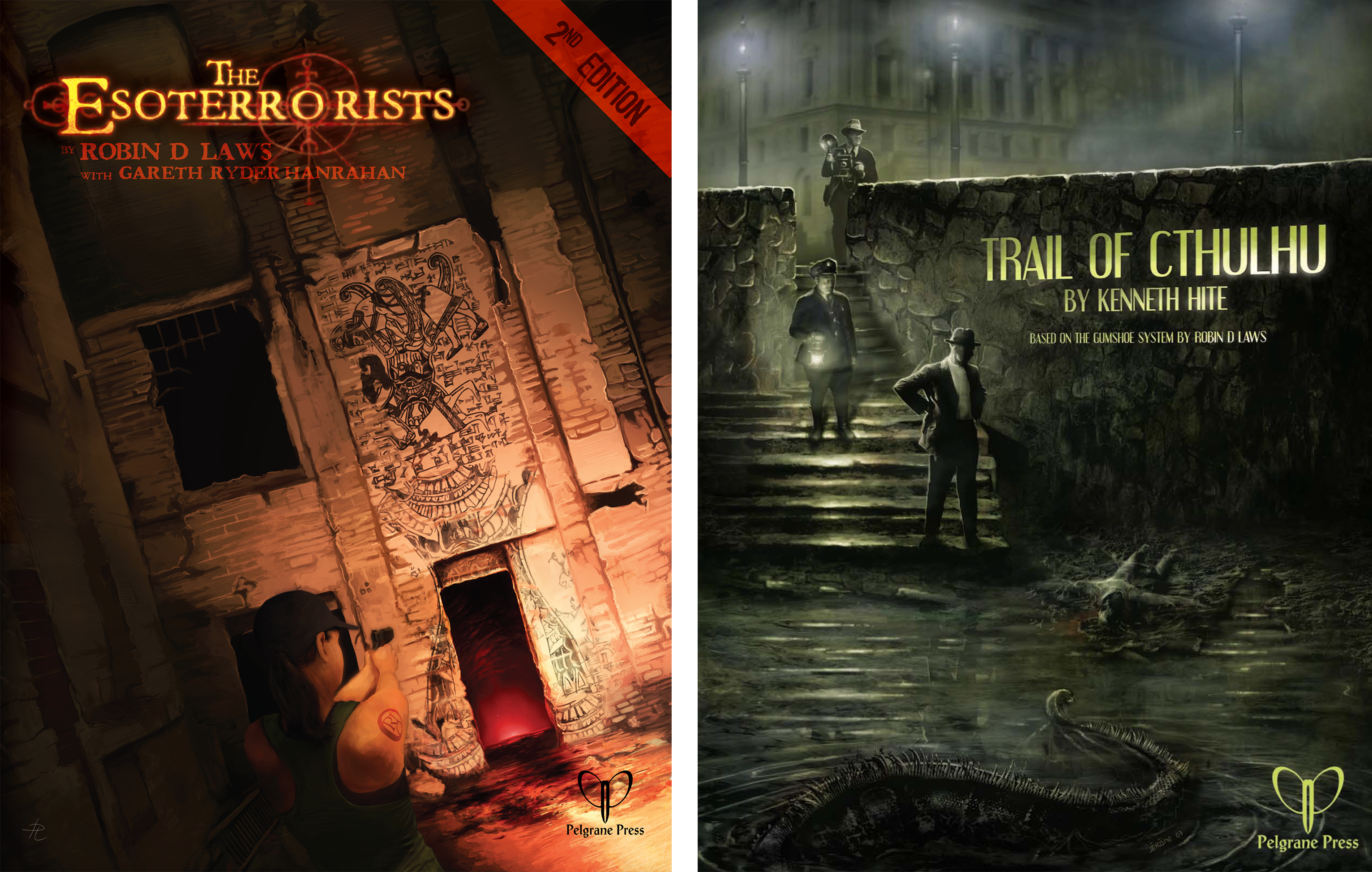
When creating an NPC for a GUMSHOE game — like Esoterrorists, Trail of Cthulhu, or Night’s Black Agents — instead of giving them ability ratings (e.g., Infiltration 10, Scuffling 8, Shooting 6), instead give them an ability modifier:
- +1 (skilled)
- +2 (excellent)
- +3 uber
You could also use -1 or -2 modifier to indicate incompetence. (Any rating lower than -2 would most likely mean the NPC automatically fails on those tasks.)
Health / Stability / Sanity: These and similar pools that are depleted via some form of damage are rated and used normally.
USING ABILITY MODIFIERS
As with an Alertness Modifier or Stealth modifier, because GUMSHOE defaults to being a player-facing system whenever possible, you will primarily use ability modifiers to modify the base difficulty of a PC’s check (which is usually difficulty 4).
Ability modifiers can also be used if the NPC makes a check, in which case the relevant modifier is simply added to the NPC’s die roll.
CHERRIES
In Night’s Black Agents, an ability rating of 8+ unlocks a cherry. Although most other GUMSHOE games do not have cherries, they similarly unlock a +1 Hit Threshold for any character who has Athletics 8+.
Most cherries are only relevant to PCs, but any cherries that may be relevant to an NPC (including the +1 Hit Threshold) are unlocked at ability rating +2.
OPTION: NPC ABILITY POOL
As an optional rule, you can also grant NPCs a small pool of general points:
- 2 (mook)
- 4 (default)
- 8 (boss)
This pool can be spent to enhance any ability the NPC possesses, as appropriate, to either increase the difficulty of a PC’s check or increase their own check result.
If using this optional rule, you may also want to give NPCs ratings of +0 in a skill (indicating that they normally don’t receive a bonus, but could choose to spend points on a check).
OPTION: THRILLER CHASES
In the thriller chase rules from Night’s Black Agents, pursuer and runner must make secret spends from their chase pool each round. Depleting the opponent’s chase pool is a key part of what makes these rules dynamic and fun, and that combines poorly with static NPC modifiers.
Option #1 – Chase Pool: For the purposes of the chase, ignore the static modifier. Instead, when the chase starts, form a chase pool equal to 3 x the NPC’s static modifier. These points can be spent in addition to the NPC ability pool (if any) during the chase.
Option #2 – Static Charge: By default, NPCs in a thriller chase always spend their static modifier. If they have a generic NPC ability pool, they can use those points to increase their spend. In addition, if they choose to spend LESS than their stat modifier, those points are added to a dedicated chase pool which can be spent on future rounds to increase their default spend.
DESIGN NOTES
Something I find frustrating while running GUMSHOE games is that it’s very difficult to use the mechanics to figure out whether an NPC can accomplish a task while taking the NPC’s skill into account. Several GUMSHOE rulebooks even go so far as to say that the GM should simply fiat all non-combat checks by the NPCs. (Which I, personally, find deeply unsatisfying and unhelpful.)
Even in combat, though, the problem persists: The PCs’ combat pools are balanced so that they can last an entire scenario and multiple combat encounters. The NPCs’ pools are given the same rating, but they can spend it all in a single encounter. The result, combined with the typical length of a combat encounter, means that you can either:
- spend no points, which means skill is irrelevant when it comes to NPC attacks; or
- spend enough points to auto-hit the PCs every single time they attack.
The latter is both devastating and deeply unsatisfying: As a GM it means I can’t just roleplay the NPCs and see how things turn out. I am instead always making a completely arbitrary decision about whether the PCs should be hit or not. (Which, ultimately, means that NPC skill is still irrelevant.)
I believe that using ability modifiers will both (a) make it easier and faster to create NPCs (by eliminating the false precision of, for example, choosing between a pool with 10 points or 12 points) and (b) allow you to actually use the mechanics of the system while having NPC skill be relevant.
In assigning ability modifiers, you’ll generally just be choosing between unskilled (no rating), skilled (+1), and excellent (+2). PCs generally have a 50% chance of succeeding on a check with the default difficulty of 4. A +1 modifier gives them a one-third chance of success. A +2 modifier means they have to roll a 6 on the d6 to succeed. A +3 modifier means the check will be impossible unless the PCs spend points — it’s not necessarily inappropriate for an NPC to have such a rating, but you’re definitely making a very strong statement about them.
FURTHER READING
NBA Opposing Forces Cheat Sheet












Yep, i have DMed using something similar to Gumshoe and it works.
I am not super familiar with all the versions of GUMSHOE, but I did recently pick up Swords of the Serpentine and have skimmed through it at this point. I double-checked, and admittedly may still be missing something, but I think it implements something very close to this system for handling NPCs in and out of combat. It also implements Mooks, which I have liked in other systems.